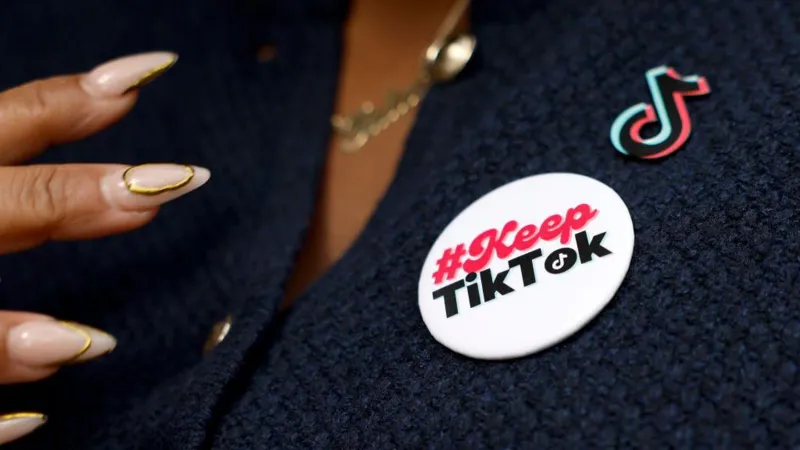International
US Supreme Court to hear TikTok challenge to potential ban

The US Supreme Court has agreed to hear last-ditch legal arguments from TikTok as to why it should not be banned or sold in the US.
The US government is taking action against the app because of what it says are its links to the Chinese state – links which TikTok and its parent company ByteDance have denied.
The Supreme Court justices did not act on a request by TikTok for an emergency injunction against the law, but will instead allow TikTok and ByteDance to make their case on 10 January – nine days before the ban is due to take effect.
Earlier in December, a federal appeals court rejected an attempt to overturn the legislation, saying it was “the culmination of extensive, bipartisan action by the Congress and by successive presidentsThe Supreme Court is the highest legal authority in the US, and the decision to take on TikTok’s case is significant as it only hears 100 or so cases a year out of the more than 7,000 petitions it receives.
TikTok had previously argued that the attempt to ban it was unconstitutional because it would impact the free speech of its users in the country.
TikTok said Wednesday it was pleased with the Supreme Court’s order.
“We believe the Court will find the TikTok ban unconstitutional so the over 170 million Americans on our platform can continue to exercise their free speech rights,” a TikTok spokesperson said in a statement to the BBC.
The appeal sets up a clash between free speech and national security, according to University of Richmond law professor Carl Tobias.
“The appeals court found that national security was stronger than the First Amendment contentions. However, the Justices will scrutinize the potentially conflicting, but significant, values,” Mr Tobias said in an email.
While it is difficult to predict the outcome, Cornell professor Sarah Kreps said it would be surprising to the court to overturn the prior rulings and go against the wills of both congress and the White House.
“The case has already gone through the executive branch, the legislative branch, and the lower court, all of which upheld the argument that TikTok’s ownership by China-based ByteDance poses a national security risk,” Dr Kreps said.
International
FTX executives shave serious time off their sentences

Ryan Salame and Caroline Ellison, FTX executives convicted for their roles in the notorious crypto fraud led by their former boss Sam Bankman-Fried, have both shaved time off their lengthy prison sentences.
Salame, a former top executive of FTX, the now-bankrupt cryptocurrency trading platform, pleaded guilty to criminal fraud charges in September 2023, and was sentenced in May to 7 1/2 years in federal prison. He began his sentence in October. But the Federal Bureau of Prisons currently lists his release date as March 1, 2031, more than a year earlier than his initial release date in April 2032. Business Insider first reported Salame’s new release date.
Ellison, Bankman-Fried’s former girlfriend and the former CEO of FTX’s hedge fund arm, Alameda Research, was sentenced to 2 years in prison after she pleaded guilty to seven federal counts of fraud and conspiracy and was a key witness against Bankman-Fried. Her current release date is listed as July 20, 2025, three months earlier than her initial release date.
Bankman-Fried, who was sentenced to 25 years in prison, does not have a release date listed on the prisons website.
The Bureau of Prisons didn’t immediately respond to CNN’s request for comment. However, in several past statements about early release dates, the bureau has told CNN that it does not comment on the conditions of any individual inmate, but inmates can earn good conduct time that is calculated into their projected release date.
Qualified inmates are currently eligible for up to 54 days of GCT time for each year of the sentence imposed by the court. Inmates have other ways of earning time credits while incarcerated, including participation in various prison programs.
FTX was a high-profile crypto startup that allowed people to buy and sell digital assets. It had its name emblazoned on an arena in Miami and on every Major League Baseball umpire’s jersey. The exchange had several celebrity endorsers and was widely believed to be a gold-standard for safety and security.
But FTX collapsed in November 2022 when customers pulled their funds as rumors spread about FTX’s unusually close ties to its founder’s crypto hedge fund, Alameda
International
Accusations of genocide. Charges of corruption. Improbably, Netanyahu had a good year

This time last year, Israeli Prime Minister Benjamin Netanyahu was in the doldrums.
“He started very low,” said Nadav Shtrauchler, a political strategist who has worked closely with Netanyahu. “The lowest point that he had.”
Many Israelis accused him of being asleep at the wheel on October 7, the deadliest attack on Jews since the Holocaust. Some even said he enabled it by funding Hamas.
His political support was dismal – even if the Gaza war let him brush aside calls for an election. Polls suggested support for his Likud Party was down 25% from just three months prior.
On its face, the year that followed was hardly uplifting. It brought tens of thousands of deaths, regional conflict, indictments, and accusations of ethnic cleansing and genocide. And yet, Netanyahu ends the year having transformed his standing in Israel.
“I am running a marathon,” he told a Tel Aviv courtroom earlier this month, facing charges – which he denies – of bribery, fraud, and breach of trust. “I can run it with 20 kilos on my back, and I can run it with 10 kilos on my back.”
International
‘It’s a scary time’: US universities urge international students to return to campus before Trump inauguration

Fear and uncertainty are spreading across many US college campuses ahead of President-elect Donald Trump’s January 20 inauguration, with some schools advising international students to return early from winter break amid promises of another travel ban like the one that stranded students abroad at the start of Trump’s last term.
In a country where more than 1.1 million international students enrolled in US colleges and universities during the 2023-24 academic year, the former president has pledged more hardline immigration policies upon his return to the White House, including an expansion of his previous travel ban on people from predominantly Muslim countries and the revocation of student visas of “radical anti-American and antisemitic foreigners.”
International students generally have nonimmigrant visas that allow them to study in the US but don’t provide a legal pathway to stay in the country.
-

 Entertainment4 months ago
Entertainment4 months agoEarthquake scientists are learning warning signs of ‘The Big One.’ When should they tell the public?
-

 International4 months ago
International4 months agoTarar accuses Imran Khan of conspiring with Faiz Hameed to destabilise Pakistan
-

 International2 months ago
International2 months agoPTI Announces Not to Boycott New Committees
-

 Business3 months ago
Business3 months agoMajor Corruption Scandal Uncovered at WASA Multan: Rs1.5 Billion Embezzlement Exposed
-

 Business4 months ago
Business4 months agoThe Impact of QR Codes on Traditional Advertising
-

 Business4 months ago
Business4 months agoThe Benefits and Problems of International Trade in the Context of Global Crisis
-

 Business4 months ago
Business4 months agoFraud by Pakistani Firm Sparks Outrage in Business Community; Concerns Rise Over International Investment
-

 Business2 months ago
Business2 months agoHigh Court Blocks MDCAT Merit List Amid Controversy Over Exam Error






